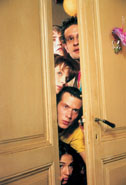
Movie Guru Rating:

Comment
on this review
| |

In L'Auberge Espagnole, it's a great time to be European
by Jesse Fox Mayshark
Let's just be honest about this: Americans have issues with Europe.
A lot of us came from there, or our ancestors did, but that in itself should tell you something. I mean, the people who really loved being in Europe, the ones who woke up every day and said, "Thank God I'm in Europe!" probably didn't feel compelled to pack their worldly possessions, book passage on a crowded, smelly boat, and sail across a whole damn ocean just to get away from the place.
Combine that with our military track record—we fought two wars with England right off the bat and have subsequently gone into battle against every major European power except France (quelle ironie!)—and the prickly state of our relations with "Old Europe" is hardly a surprise.
The thing is, Americans have this unshakable suspicion that even now, even after we've made ourselves into the greatest power the world has ever seen, even after we've won world wars and knocked over tinpot dictators (and/or installed them, depending on the circumstances) and sent our corporate heralds out to remake the world in our image, even after all that, we think that maybe Europeans look down on us. That they snigger at us from beneath their berets. That, given half a chance and a jug of wine, they'll seduce our women (and our men too), insult our culture in words we don't understand, and generally make us feel stupid. We don't like feeling stupid.
For what it's worth, we're not just being paranoid. A lot of Europeans really do feel superior to Americans. There are Asians and Arabs and Africans who also feel superior to Americans—Canadians and Brazilians too, for that matter—but we're not tuned in enough to those cultures to pick up on it. We don't care so much what they think. But Europe is different. A European feeling superior to us really pisses us off, because somewhere deep inside we're afraid he's going to start talking philosophy or, worse, quoting sections of our own Constitution that we haven't read since 7th grade, and we won't know what to do except possibly punch him in the nose.
And if you're of a mind to punch Europeans in the nose, you definitely should not see L'Auberge Espagnole. The movie is basically a big happy brochure for the European Union. It's about a young French guy who signs up for an economics exchange program in Barcelona. A friend of his father's has advised him to learn Spanish and get an MBA, "international business" being the "plastics" of the new Old Europe. So, in a plot development familiar to anyone who's seen The Real World, he ends up sharing an apartment with a group of roommates who just happen to represent the core of the EU (helpfully identified by flags during the opening credits—you do know your European flags, don't you?).
In director Cedric Klapisch's overly cute schema, each character takes on attributes of his or her homeland. The English girl picks up after everyone else, doing the dishes and keeping things clean and grumbling the whole time. The Italian guy loafs a lot. The German is always doing homework. And the French guy is eternally unsure of what he wants. He has a crush on the Belgian girl, but she turns out to be a lesbian (who nevertheless coaches him on romantic technique).
For the most part, the film is engagingly breezy. Klapisch, whose first movie was the charming When the Cat's Away, has an offhand tone that's pitched somewhere between Truffaut and an episode of Friends. There are plots and subplots, and even a doofus American who shows up singing Bob Marley songs and manages to bed the English girl (of course) while the rest of the roommates roll their eyes at his gaucheness. L'Auberge Espagnole makes a few stabs at dramatic complications, but in the end its moral is chirpily clear: We can all live together in this crazy old place, and it's a great time to be European and young!
As it happens, I don't doubt either of those premises. The European Union is a fascinating thing to watch as it evolves, and I'm certainly willing to believe that young Europeans are having plenty of fun these days. But there's a cloying narcissism about Klapisch's pep rally. That's fine, as far as it goes—given the American propensity for relentless self-congratulation and self-promotion, it's hard to begrudge it to anyone else. I can certainly understand why the film is a euro-hit: It forecasts a future in which Europe figures large as an integrated cultural and economic force. And hey, hurray for Europe. Beats the hell out of shooting each other.
But the film is something of a trap for Americans grown weary of our own chest-thumping and flag-waving. It is refreshing, at first, to be offered a different prism on the world. And in some ways it does seem like a fresher, hipper prism—as obvious as the Radiohead selections on the soundtrack are, I'll take them over Lee Greenwood any day. Once you get past the novelty, though, European solipsism isn't really that much more interesting than our own. The movie's title is slang for "Euro-pudding," and it's a fair enough summation of the film: light, sweet, and a little gloopy.

June 19, 2003 * Vol. 13, No. 25
© 2000 Metro Pulse
|